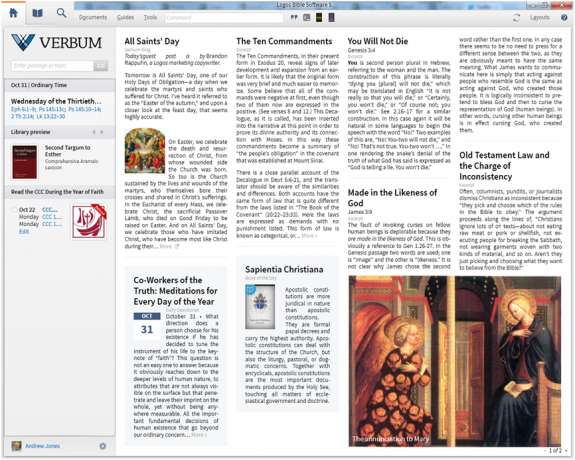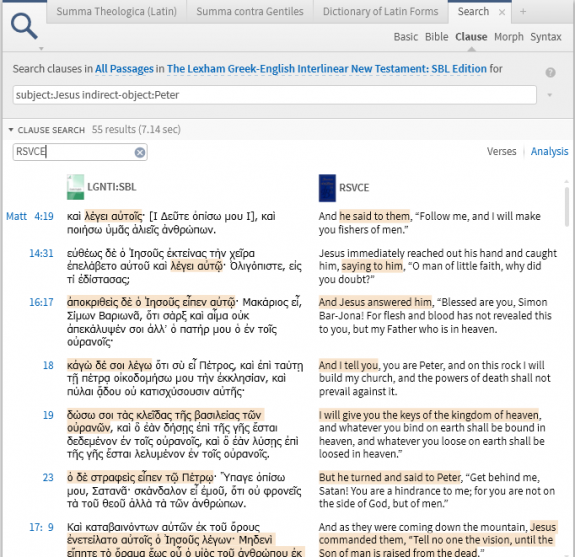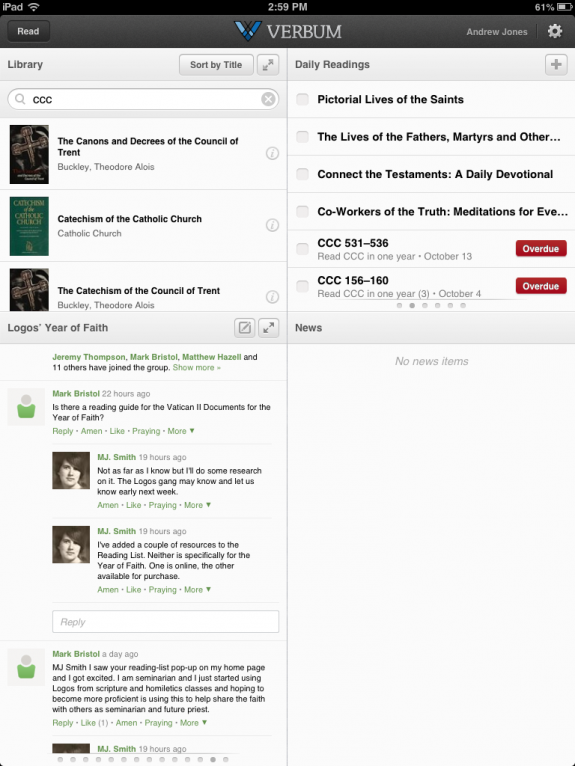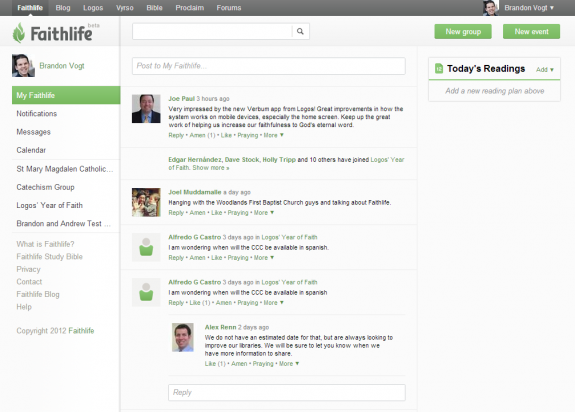Check back tomorrow because I’m giving away a complete Verbum Basic package from Logos. It includes 226 books and resources —a digital library worth over $2,700!

NOTE: Despite my enthusiasm, I don’t work for Logos nor do I receive anything for promoting them outside of testing software. I’m just a huge fan of their products.
I’ve written twice before about the Logos Bible software. First I shared seven ways it can revolutionize your faith. Then I highlighted the new Logos Catechism app.
But since then, Logos has made several huge improvements. The biggest is that they’ve re-branded their Catholic arm, “Verbum.” This short video from Andrew Jones, Director of Catholic Products, covers more of the biggest improvements:
In my mind, Verbum remains the greatest Biblical tool ever available to the Church. I can’t imagine what St. Jerome, St. Augustine, or St. Thomas would have done to get their hands on it.
Thanks to Logos, I got to test-drive the Verbum software, and here are my impressions of their newest features:
1. Verbum, the Catholic Logos.
The newest and most obvious development is Verbum, a separate Logos product line for Catholics. When the company first started, Logos was initially geared toward Protestants. So it was exciting when, a couple years ago, they began moving into the Catholic market. Their early Catholic products were limited to just a few books by the saints and a couple by modern theologians, but it was still encouraging. Over the years they added more titles, including the Catholic editions of the Church fathers, stripped of any anti-Catholic commentary.
But with Verbum, they’ve taken a huge leap forward. Verbum is still under the Logos umbrella, but it’s a specially designed product line and a whole new experience. Recognizing that Catholics study the Bible differently than Protestants, the Verbum software has been tweaked to make it easier for Catholics to read Scripture in light of Tradition. It has several built in features which make studying the Church Fathers, papal encyclicals, and the writings of the saints easier than ever before.
In his interview with Thomas McDonald, Andrew Jones gives one example:
“One of the things we did was create default segments within the library of texts. There are three of them: Catechism, Church Fathers, and Church Documents. These segments allow for some simple, but very useful, functionality. For example, if you are doing a search on the word “Eucharist,” you can very quickly limit it to just the writings of the Church Fathers or to the Catechism.”
Another big addition is Latin. Verbum features Latin versions of the Bible, the Summa Theologica, and many magisterial texts. I’m just a Latin novice, but within a few minutes I was using the Latin toolset to compare different words and translations. Verbum makes it easy to study the Latin—and Greek and Hebrew—even if you have no linguistic background.
The new Catholic line also arrives with scores of new books. Verbum now offers all the papal encyclicals since 1740; the Papal Exhortations and Constitutions of John Paul II and Benedict XVI; a reverse interlinear of the RSV-Catholic Edition of the Bible; and sermons of St. Thomas Aquinas, history works, reference books, and of course many, many different Bible texts.
All of this shows how committed Logos is to Catholics. The Catholic software is no longer just a half-hearted addition to their much larger Protestant collection of resources. It’s now a unique package specifically designed for Catholics.
2. Logos 5 engine.
The Verbum Catholic software is distinct from the regular Logos software, but each runs off the powerful new Logos 5 engine, which itself brings several new features.
One of my favorites is the “Clause Search,” which harnesses the meticulous tagging and coding built in to each of Logos’ resources. This allows you to perform special searches such as the one below, which returns every Biblical instance of Jesus speaking to Peter. What’s neat is that it doesn’t just search for the actual names “Jesus” and “Peter.” It also recognizes passages like Matthew 16:19, where the “I” is Jesus and the “you” is Peter.
Like past iterations, Logos 5 also links all your resources together. It allows you to easily explore Scripture alongside the writings of popes, Church fathers, saints, and scholars. And it lets you jump from citation to source with one click. For example, when you’re reading a passage in Matthew that references an Old Testament prophecy, you simply hover your mouse over the citation and a small pop-up box appears with the Old Testament verse in context.
3. Catechism resources.
Our current Year of Faith is aligned with the twentieth anniversary of the Catechism of the Catholic Church, and Pope Benedict has encouraged all Catholics to study this “sure norm” of faith.
With Verbum, that’s easier than ever before. Andrew Jones explains:
“With the Catechism of the Catholic Church Collection, thousands of the Catechism’s citations come alive, linking to the original documents. The Collection allows you to get behind the Catechism’s summary of the faith and into the primary sources themselves. The Collection includes the most important texts cited by the Catechism and so allows one to see not just what the contemporary Catholic Church teaches, but what it bases this teaching on.
What’s more, the Catechism itself can be used as a type of commentary on the other texts in the collection. For example, one can quickly find every instance of the Catechism citing a certain document of Vatican II or a particular Bible verse. The Collection includes the lectionary of the Catholic Church, so the Catechism becomes an automatic companion to the daily readings.”
Watch this video to see it in action:
Logos also has some great pricing options for the Catechism. If you just want the straight Catechism text, you can get that for $15 ($25 for English and Latin). Within seconds you’ll be able to access it on your computer and whatever digital device you own.
If you’d like the bigger collection, however, which comes with the Catechism and other documents it references like the conciliar documents of Vatican I, Vatican II, and Trent, and Denzginer’s Sources of Catholic Dogma, then you’re looking at about $50—still a huge bargain for all the books you get.
One neat feature is that if you just purchase the bare-bones Catechism for $15, then download the free Verbum mobile app, you’ll get several mobile-only resources (see point #4 below) which will be integrated into the Catechism, free of charge.
Finally, here’s the best news: thanks to Andrew, if you use the code CATECHISM during checkout, you’ll get 30% off any of the three Catechism packages, bringing them to down to these prices:
- $10.50 – Catechism of the Catholic Church (English)
- $17.47 – Catechism of the Catholic Church (English and Latin)
- $34.97 – Catechism of the Catholic Church Collection (English and Latin) plus nine other resources
4. Mobile app.
The Logos desktop software has always been strong, and their early mobile apps were impressive. But the new re-designed Verbum mobile experience knocks it out of the park.
First of all, it allows you take your entire library anywhere. When you’re sitting on the bus you can whip out your cell phone and read a few articles from St. Thomas’ Summa. You can lean back on an airplane and dive right into Pope Benedict’s Introduction to Christianity or today’s Scripture readings. Wherever you are, you have access to your entire library on your phone, tablet, or e-reader.
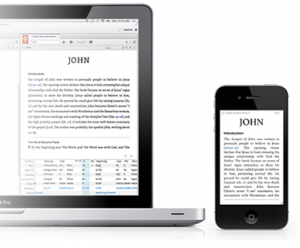 Second, everything syncs across multiple devices. When you finish reading the Bible, the Catechism, or a resource from your collection, the mobile app will save your spot and sync it with your computer and other mobile devices. Next time, you can pick up right where you left off, even on a different device. Your Logos account also syncs your notes, bookmarks, and highlights through the cloud.
Second, everything syncs across multiple devices. When you finish reading the Bible, the Catechism, or a resource from your collection, the mobile app will save your spot and sync it with your computer and other mobile devices. Next time, you can pick up right where you left off, even on a different device. Your Logos account also syncs your notes, bookmarks, and highlights through the cloud.
Finally, as I mentioned above, it comes with free content. When you download the free Verbum mobile app (currently available only for iOs, but soon coming to Android) you automatically get several free resources, including:
- The Bible in multiple versions (Douay-Rheims, King James, Clementine Vulgate, Great New Testament, and more)
- Catholic Lectionary (the daily Mass readings)
- Sources of Catholic Dogma by Henry Denzinger
- The Imitation of Christ by Thomas A’Kempis
- Orthodoxy by G.K. Chesterton
- An Essay on the Development of Christian Doctrine by John Henry Newman
Even if you use it for nothing other than the daily Mass readings, the free app is worth the download.
5. Social integration.
The final big addition to the software is what Logos calls “Faithlife.” Faithlife is a social network designed around the Logos software. It allows you to create groups with other friends and share notes and reading plans.
For example, your whole Bible study group, parish men’s group, or RCIA class could download the free mobile app, sign up for a free Faithlife account, and then read through a specific book of the Bible together. Along the way people could discuss what they’re reading through Faithlife, which looks and feels a lot like Facebook.
Verbum has created a Faithlife group for every parish in the country, so find your own, encourage other parishioners to log-in, and begin studying the great Tradition together.
The Catholic Church has always understood that the Scriptures as communal texts, meant to be read and interpreted within a community of faith. Faithlife is the first tool I’ve seen that easily (and freely!) allows you to do that.
Now after highlighting all those cool features, I must add the same sobering caveat I’ve mentioned before: the Verbum packages ain’t cheap. They range from the basic collection at $270 (226 resources) to the Capstone collection at $2,290 (1,020 resources.)
But after the initial sticker-shock wears off, consider that the price is roughly equivalent to one college course or a few textbooks. Yet, it gives you way more value and power than either of those. Also, according to Logos, if you bought the print copies of each book in these collections you spend 5-10 times more money. And the print books wouldn’t come with all the interlinking and search features that Verbum offers.
If that still seems too expensive, you might consider some creative ways to afford it. If you give talks or do freelance writing, for instance, you might use your stipends or writing payments to cover the cost. For me, this software has improved my writing and speaking and therefore led to even more opportunities. From that perspective, it’s an investment.
Another suggestion is to set aside $10 a week. That’s the cost of one lunch or one dinner out. In just six months, you’ll have enough to purchase the Verbum Basic package.
But here’s one thing that will definitely help offset the cost. If you use the coupon code “BVOGT” you’ll save 15% off any of the Verbum base packages (but not the individual resources.) I don’t get any sort of kickback through that code, it’s just something Logos offered to help my readers out.
If you’re still not ready, at least download the free Verbum mobile app and take advantage of all the cool features it brings.
Check out Thomas McDonald’s review of the Verbum software.


